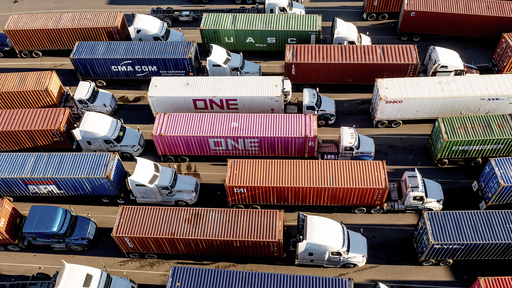
A major new tariff imposed by the U.S. on products imported from China is likely to lead to higher prices for American consumers across a diverse array of goods. These products range from inexpensive clothing and toys to electronic devices like smartphones and computers.
As of Tuesday, an extra 10% tariff on all goods from China has been implemented, and the U.S. Postal Service has announced a temporary halt on accepting packages from China and Hong Kong.
Prior to this, President Trump had paused his proposed tariffs against Mexico and Canada for 30 days, following discussions aimed at addressing issues surrounding illegal immigration and the influx of drugs such as fentanyl into the U.S. However, China retaliated by announcing tariffs on certain U.S. goods, set to take effect next week.
Due to the extensive range of China-made items available in the U.S. market, consumers can expect to notice gradual increases in the prices of many traditionally low-cost goods if the tariff escalations continue.
Among the categories that could be affected are electronics, household goods, and automotive parts. In 2023, the U.S. imported approximately $427 billion worth of goods from China, making consumer electronics, which include smartphones, laptops, and various tech accessories, one of the largest import categories.
China remains a significant hub for manufacturing technology, including products from American firms like Apple that rely on Chinese facilities for assembly. Reports indicate that in 2023, China accounted for 78% of U.S. smartphone imports and 79% of imports of laptops and tablets, according to the Consumer Technology Association.
Tariffs are also likely to impact the cost of usually affordable clothing, footwear, kitchen items, and larger appliances and furniture. Jay Salaytah, a 43-year-old auto repair shop owner in Detroit, mentioned that he purchased necessary equipment earlier than planned, anticipating a price hike due to the anticipated tariffs.
In addition to the new tariff, Trump’s executive order has also temporarily suspended a little-known trade exemption that allowed imports valued under $800 to enter the U.S. without duty. This exemption, known as “de minimis,” has been in practice for nearly a century but has garnered attention due to the influx of inexpensive goods coming from China, particularly via well-known online retailers like Shein, Temu, and AliExpress.
The issue was already being addressed by the Biden administration, which proposed reforms to the loophole prior to his exit from office. Retailers Shein and Temu have become popular for offering a briskly updated selection of low-cost apparel, accessories, and gadgets, enabling them to compete effectively in the U.S. market. Amazon is also attempting to rival these businesses by mimicking their model and offering inexpensive products shipped directly from China.
Exports of low-value packages from China surged to $66 billion in 2023, a strong increase from $5.3 billion in 2018. Retailers like Temu and Shein now represent approximately 17% of the discount market for fast fashion, toys, and other consumer goods, according to a recent Congressional Research Service report.
The extent of the anticipated price increases remains uncertain. Under the former exemption, shipments from Shein, Temu, and AliExpress were not subject to customs taxes but will now be affected by the new 10% tariff. Analysts suggest that since the majority of orders from these retailers are under $800 in value, most of them will incur additional costs.
Some experts predict that the impact on prices for low-cost platforms like Shein and Temu will be minimal, and the products they offer will still remain affordable. However, new customs requirements may lead to delivery delays.
Third-party sellers on platforms like Amazon that import goods from China will also face implications, with some analysts forecasting that sellers may absorb part of the added costs while passing on a portion to consumers, potentially leading to mid-single-digit percentage price increases. Other online marketplaces, such as Etsy, could also feel the repercussions of these changes.
Notably, Temu, under China’s PDD Holdings, has publicly stated that its growth isn’t reliant on the de minimis policy. While most of its inventory is shipped from China, Temu has begun recruiting Chinese merchants to stock goods within the U.S. to mitigate potential trade issues.
In January, China implemented new strategies to support cross-border e-commerce by providing tax incentives for overseas warehousing, aimed at boosting exports.
Regarding how U.S. retailers are responding to the changes, Brieane Olson, CEO of teen apparel retailer PacSun, has been proactive in discussing strategies with factory leaders in Hong Kong in anticipation of Trump’s tariff plans. Approximately a third of PacSun’s products are sourced from China, yet they are looking to diversify their supply base to include other countries like Cambodia and Vietnam.
Despite this, Olson noted that the 10% tariff was less severe than expected, so PacSun currently has no plans to raise prices or shift its manufacturing operations for knitwear and denim out of China. Additionally, toys, which are heavily imported from China, are another consumer product that is poised to be impacted. According to Greg Ahearn, president and CEO of The Toy Association, toy manufacturers are likely to initially absorb the costs associated with the new tariffs before ultimately passing them on to consumers.

